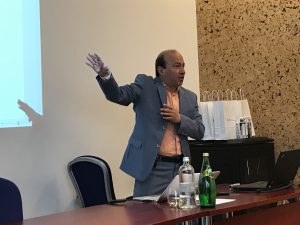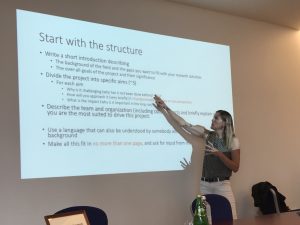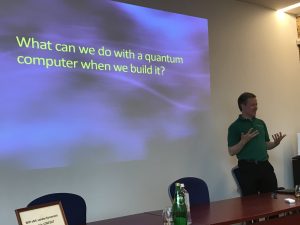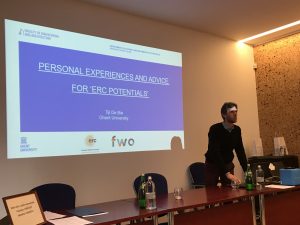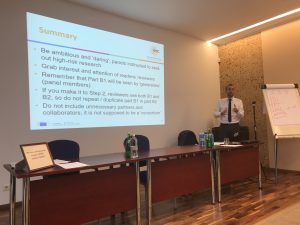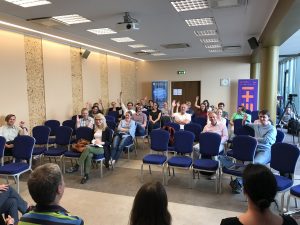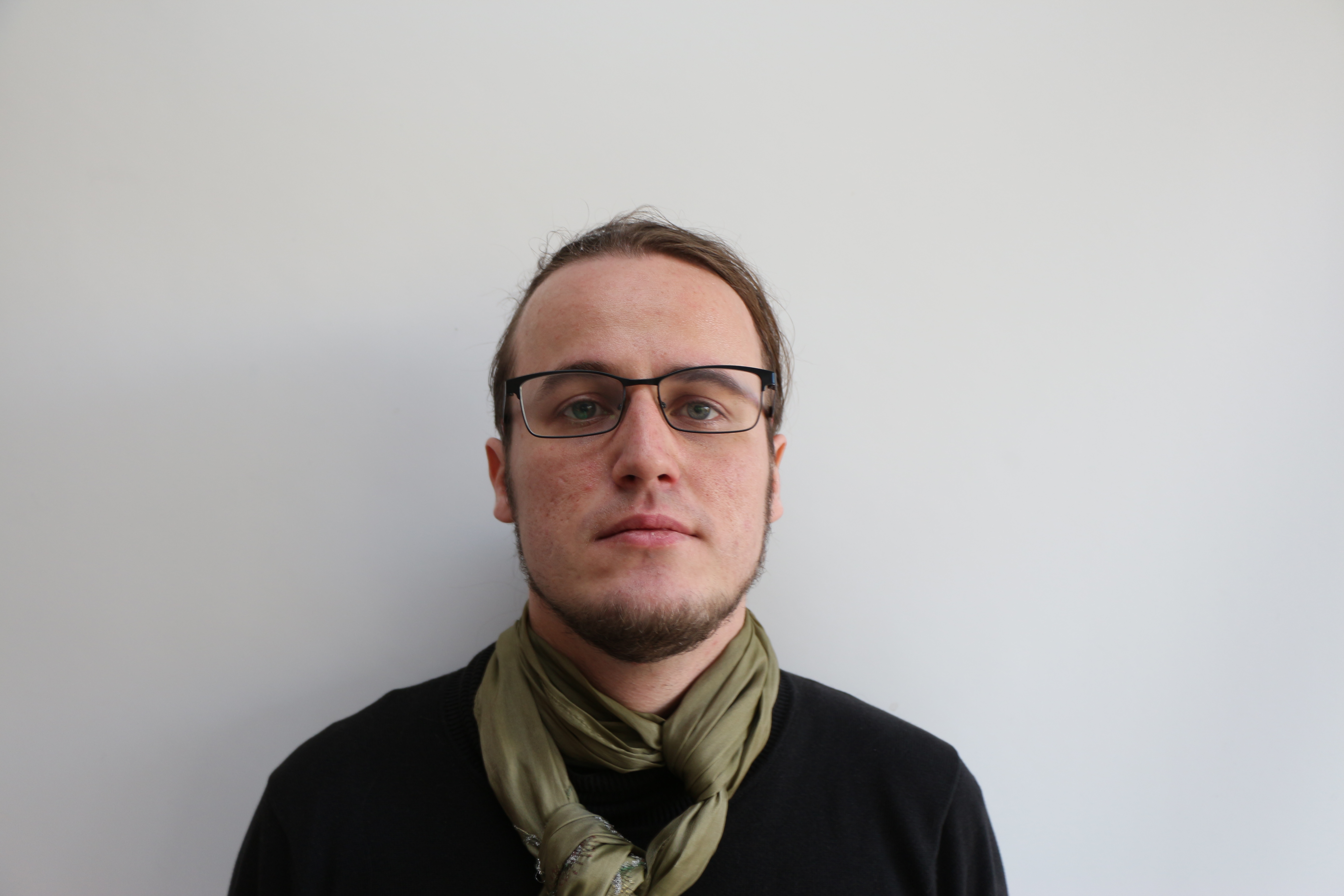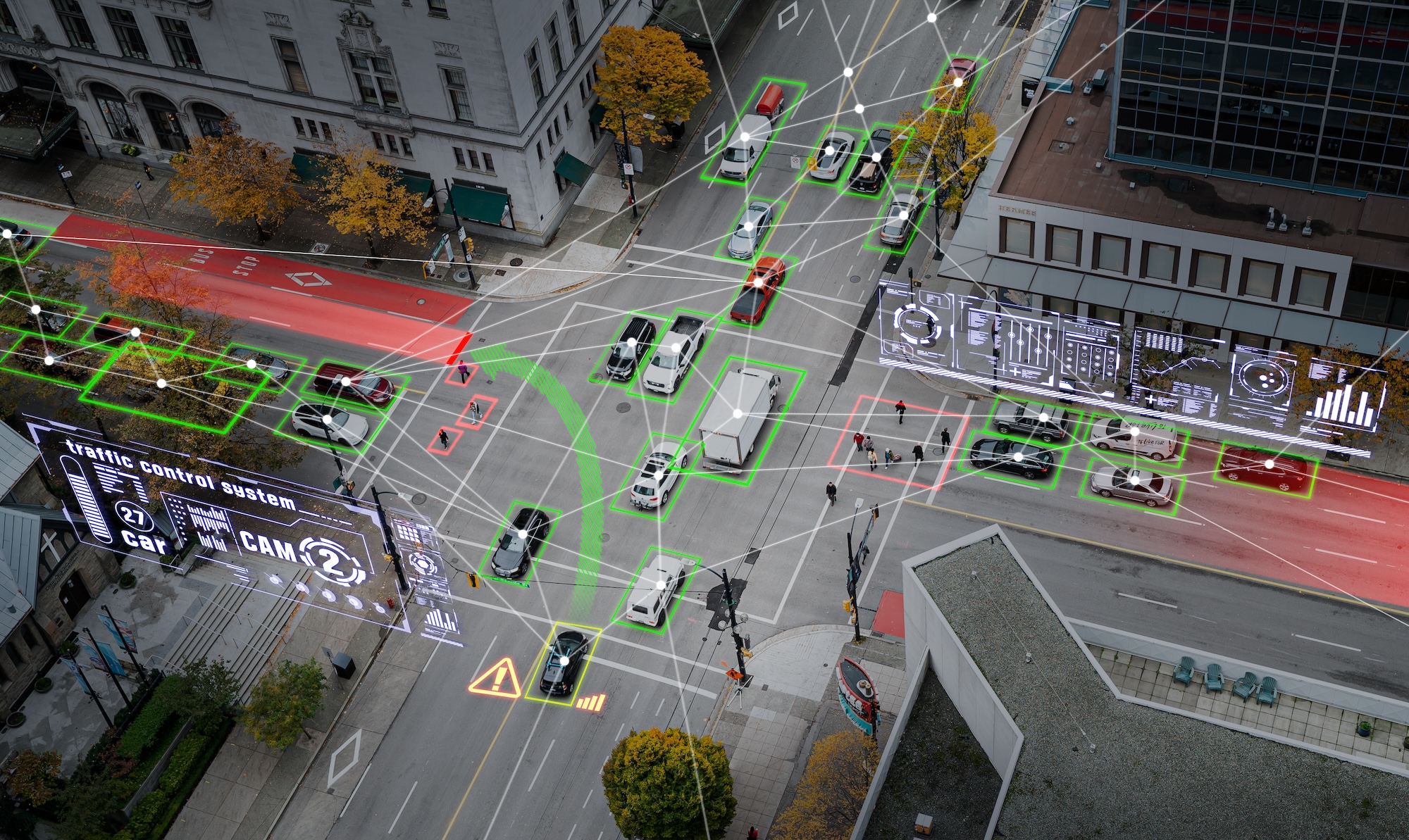Authors: Jaak Vilo, Heisi Kurig, Marlon Dumas
On May 23-24, we held a workshop for preparing applications for European Research Council (ERC) grant schemes was held in Tartu. The workshop was aimed at future ERC applicants for starting and consolidator schemes. Speakers were experienced people – ERC grant holders describing their personal stories, grant office, and ERC office.
The goal of the event was from the beginning to help and encourage researchers to develop prestigious research ideas and plans, as well as prior CV-s that would be competitive in the ERC. Additional goal was to discuss and understand why there is such a gap in poor success from EU-13 countries (nations that joined the EU since 2004). The initial narrow specialisation in computer science and informatics was broadened and participants from all disciplines were encouraged to participate.
The event turned out a great success by many criteria: We got 47 registrations from various disciplines (ICT, humanities, social sciences, life sciences, etc.), different age groups (2-7 year from PhD; 7-12 years from PhD; senior; from both the academic careers tracks and the grant offices and support structures). Participants came from Estonian universities, Latvia, Lithuania and Finland. Atmosphere was insipiring, informal and encouraging throughout the event.
The schedule of the event can be found here.
Speakers and Key Points
Day 1:
Marlon Dumas – Professor of Information Systems, University of Tartu, Chair of the ERC Starting Grants Panel (Computer Science and Informatics)
– ERC panel is looking for a highly promising early-career researcher for starting grants who is well-focused, independent and have a fundamentally new idea.
– A smaller number of publications with high-impact are better than a large number of low-impact publications.
– You can have ERC without ever working outside of your University. However, you have to be able to demonstrate that you have a wide collaboration network, generate ideas of your own, and are highly appreciated in your research community.
– Find a gap and suggest a way to fill it! Remember that you have to contribute to filling the gap. You do not have to be a Superman/-woman who closes the cap all by him-/herself. You just have to show that your research is one but important part of filling the gap.
– Note to leaders in science: encourage your employees to focus on quality instead of quantity!
– Use graphs, diagrams and pictograms!
– Say more by saying less! Do not try to fit in as much text as possible. Reviewers and panel members hate to see a document which is hard to read.
You can download Marlon’s presentation here.
Carolina Wählby – Professor in Quantitative Microscopy, Centre for Image Analysis, Uppsala University; ERC project TissueMaps
– Start with the structure! Write a one-page of well-structured keywords under topics like Short Introduction, Specific Aims, and The Team.
– Everyone has the time to read one page! Take your one-page structured keywords and ask for feedback as much as you can.
– Use language that can be understood by somebody with a different background.
– This is like writing a research paper but instead of solid facts you can dream and use your imagination
You can download Carolina’s presentation here.
Andris Ambainis – Professor of Quantum Computing, University of Latvia; Methods for Quantum Computing
– Plan at least 100 hours of writing for the already thought-through concept. If your concept is yet raw, plan even more time.
– Use examples! Andris used 4 different successful ERC grant applications as examples and understood that they all were different in style, neatly tailored according to the PI and the project. He worked out his own style.
You can download Andris’ presentation here.
Day was closed with flash talks from several future ERC applicants as well as free one-on-one meetups and birds of feather sessions. Joint dinner in French restaurant Pierre on Town Hall Square helped further lower the barriers in between speakers, participants and different research areas.
Day 2:
Tijl de Bie – Professor at Ghent University, ELIS department, University of Ghent, ERC grant FORSIED
– Be generous to yourself and don’t give up after the first try!
– Preparing yourself for ERC grant takes time: the development of ERCable researcher profile takes at least 5 years, developing your idea takes at least 3 years.
– Better to start too early than too late.
– Getting an ERC grant is not about being smart. It takes consciousness, critical thinking, and knowing your shortcomings. And of course a great idea!
– The support from close colleagues is important during the grant writing period. A very successful group in ERC grant applications has a vibe and strong support to each other.
– Being secretive is not helping you. Talk to your friends and enemies in science – even provoke them. The last ones might give you the best advice you get.
– Start with „Why?“ i.e motivation. Then write about „What?“ i.e overall goal and objectives on 1 page. Explain „How?“ and then a „Detailed how?“. You have to reach both – the generalist (panel members) and the specialist (reviewers). Last but not the least – do not forget about the risks and how you manage them.
– Who has been in your panel before on the level of StG, CoS, and AG? Aim your idea to one of them who would fall in love with your idea from the first sight.
– Feel the ERC! Learn, look, and feel the funded ERC projects. What in them speaks to you? What do you believe granted them the success?
Stefanie Vrancken – Policy Advisor, Academic Affairs, Research Department, Utrecht University
– On the language to use – be specific: Avoid vague statements. Use specific and active speech instead like „This study will be the first to…“ and „I will…“
– Avoid sentences longer than two lines.
– Use verbs instead of noun constructions
– Write positively e.g „This has not been done before…“ vs „I will be the first to …“
– Write with conviction!
– Clearly distinguish previous and research during this project
– Keep in mind that CV is personal. It’s all about you, not your group.
– Show independence and initiative
– The first impression is important – use neat layout and structure for your CV
Martin Penny – Head of Unit Physical Sciences and Engineering (ERCEA.B.4), European Research Council
– ERC has the goal to offer creative freedom for individual grantees
– Make sure that you state clearly who was your supervisor(s) for your PhD studies and then demonstrate your independence from them.
– Read the information to applicants! It contains many answers you seek for. It is surprising that not so many applicants read that.
– In the case of rejection, you will get a very thorough feedback on your application. Use that wisely for your next attempt. When the overall success rate is around 11-12%, the success rate for re-appliers is 23%!
You can download Martin’s presentation here.
Panel discussion of the second day
– How to shoot at the right level?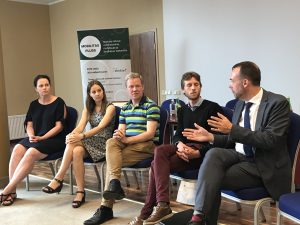 Promise what you believe you can really deliver, be authentic, and believe in yourself and your project.
Promise what you believe you can really deliver, be authentic, and believe in yourself and your project.
– What would encourage more scientists in Estonia to write more ERC grants? There already is plenty of support from ETAg at the national level e.g. Consolidation Grants, Visits to ERC grantees, organizing mock interviews, proofreading for B1 section of the application.
– More support is needed from the closest range of researchers. Firstly, the understanding that applying for the grant takes time, some seniors even do not know about the grant, teamwork and a good mentor.
Jaak Vilo, main organiser of the event said in the closing session that he was positively surprised about the traction and hugely thankful to all speakers and participants. He also concluded that writing an ERC grant application is not only about being successful in one possible call out of many.
Working out and writing up your main core research ideas in concise manner will help researchers regardless of them earning the winning grant or not. The contents will help performing well planned research,writing research papers as well as writing other grant applications in future.
Participants’ Feedback
Jane Klavan: If I had to choose only one keyword to describe the event it would be INSPIRING.
For me, as someone who is at the early stages of their independent research career, the event was highly beneficial – hearing the personal experience of the grantees and the ERC’s own perspective both helped as a reality check and as a boost of motivation. From what I saw and heard during this training session is that if you are driven and you have a brilliant idea, there is no reason why you shouldn’t apply. It only takes ingenuity and willingness to work hard. It was an eye-opening as well as an inspiring event.
There should be more of these events – targeting all of the fields and trying to get a mix of people to participate, both young promising researchers as well as researchers further into their career. It was inspiring to see researchers from Estonia devoted to their research gather together in one room – the room was literally brimming with brilliance 🙂
The atmosphere was both academic and informal at the same time, encouraging participants to raise issues that concern them the most. It was an excellent idea to have the flash-talks, but I think for this to work better people need to know beforehand in order to prepare better and to get the most out of such an opportunity.
All in all, a huge thank you to the organisers!
And if I am permitted a little bit of satire (but behind every joke there is some truth): Let’s have more of these events and let’s encourage and support promising researchers working in Estonia to put their ideas forward and bring the ERC grants to Estonia!
Kairi Kreegipuu: Thanks for the workshop! I suspect that the hands that were up were so really intentionally. BUT I’m also sure that it is too easy to lose motivation while alone with one’s ingenious idea and putting the application together. My suggestion would be to keep the process follow-upped. It’s cheap but should work! Just to ask the interested young scientists go together again and share the success or troubles, introduce their projects and get criticized. Once a month perhaps?
